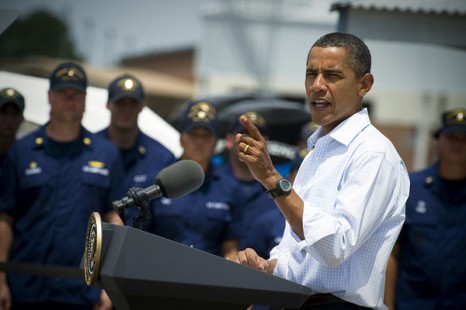Alex Randall
At a press conference in Germany, Barak Obama spoke about America’s efforts to reduce carbon emissions and US and European cooperation on climate change. The speech should be welcomed. Although political rhetoric is often hollow, at least the US president is making the right noises. This is more than can be said for many senior British politicians.
However, one of the reasons Obama gave for averting climate change was the threat of “new waves of refugees”. Is this likely? And is it a helpful way to talk about the future impacts of climate change? I would suggest that it isn’t, for three reasons.
1. It sees people as a threat. The idea of “new waves of refugees” is designed to sound scary, and hopefully to make the public see that there will be terrible consequences of not stopping climate change. However is casts refugees as a threat. It makes a group of people into one of the terrifying consequences of climate change. It further dehumanises a group of people who are already the subject of discrimination and violence. There are impacts of climate change which are genuinely frightening. We should not shy away from talking about these as long as we do it accurately. Obama was right to talk about the disasters like storms, famines and floods that could be exacerbated by climate change. However adding a group of people to a list of disasters is not helpful.
“…adding a group of people to a list of disasters is not helpful.”
2. It’s unlikely to be how movement linked to climate change actually happens. There are important connections between the movement of people and climate change. However the idea of “new waves of refugees” brings to mind something that is unlikely to be caused by climate change. This image suggests millions of people, all moving at once, all heading for the same place and crossing international borders. It is far more likely that climate change will reinforce existing trends for short distance, internal and temporary movement. So while “new waves of refugees” is a compelling image it is unlikely that this will actually become a reality. If we describe the issue in the wrong way, we come up with the wrong solutions. The “new waves of refugees” narrative suggests that developed countries should begin planning for a mass influx of people from developed countries. In fact our attention should be focused on managing disaster risk in growing coastal cities in developed countries where people are more likely to move to. We should also be thinking about supporting families who remain in rural areas while some family members move away to find work. We should also be considering how to support young people who arrive alone in cities.
3. People who move in the context of climate change won’t technically be refugees. This might sound like a technicality but it’s a very important distinction. The 1951 Refugee Convention defines who is and who is not a refugee. To be a refugee someone must be outside their own country and fleeing persecution because of their “race, religion, nationality, membership of a particular social group or political opinion”. Refugee status goes some way to ensuring that a person’s rights are protected in their host country and that they cannot be sent back to a country where they might be persecuted. People fleeing climate linked disasters would not be entitled to this protection. This is firstly because they are unlikely to have crossed a border and secondly because they are not fleeing persecution. This doesn’t mean that their rights should not be protected and they should not receive support. But it does mean that they are in a very different legal position to “Convention” refugees.
Obama was right to draw attention to the disasters that might result from climate change, but it was unhelpful and inaccurate to add “new waves of refugees” to the list of problems.
Alex Randall



This is a very good critique, Alex. Thank you for writing it. We should also remember that this is not the first such reference to ‘climate refugees’ made by Obama. In his inaugural address to the UN General Assembly in 2009, he made a similar reference to ‘climate refugees’. It would be naive to assume that his use of the term is casual and without calculation. I think we need to assume that the Obama administration has made a calculated decision to use this term, and, if that’s the case, we need to ask why. Does the Obama administration use it simply as a rhetorical device? Or might there be other plausible explanations for why Obama uses the term, assuming that his administration is well aware of the controversy that surrounds its use? Its hard to imagine that his use of the term has not been vetted by his legal team.
Hi Andrew, I think we must assume that it’s a calculated rhetorical device. I guess there are a number of reasons they might have chosen it (none of which make it ok): 1) it’s a compelling image. Everyone one can picture a refugee. Saying “people who have an environmental dimension to their movement” doesn’t bring a powerful image instantly to mind. 2) It plays to two sets of different values. Some people will hear “waves of refugees” and think of a new security problem that must be met with more fences and patrol boats. Others will imagine a new humanitarian problem that will require US sympathy, aid and international cooperation. It’s a compelling image and problem, regardless of someone’s values or politics. None of that makes it alright, but perhaps it goes some way to explaining why they’ve chosen the phrase.
Our deepest condolences for
Bangladeshi Climate Victim, Nepal Tremor, New Zealand Storm and the USA Flood
victim. Nature is rebellious – Demand Absolute Care. Let’s bridle on our
CONSUMPTION SLAVERY, IMPRUDENT RESOURCE EXTRACTION.
http://sasrai.com/climate-refugee-illegal-migrant/